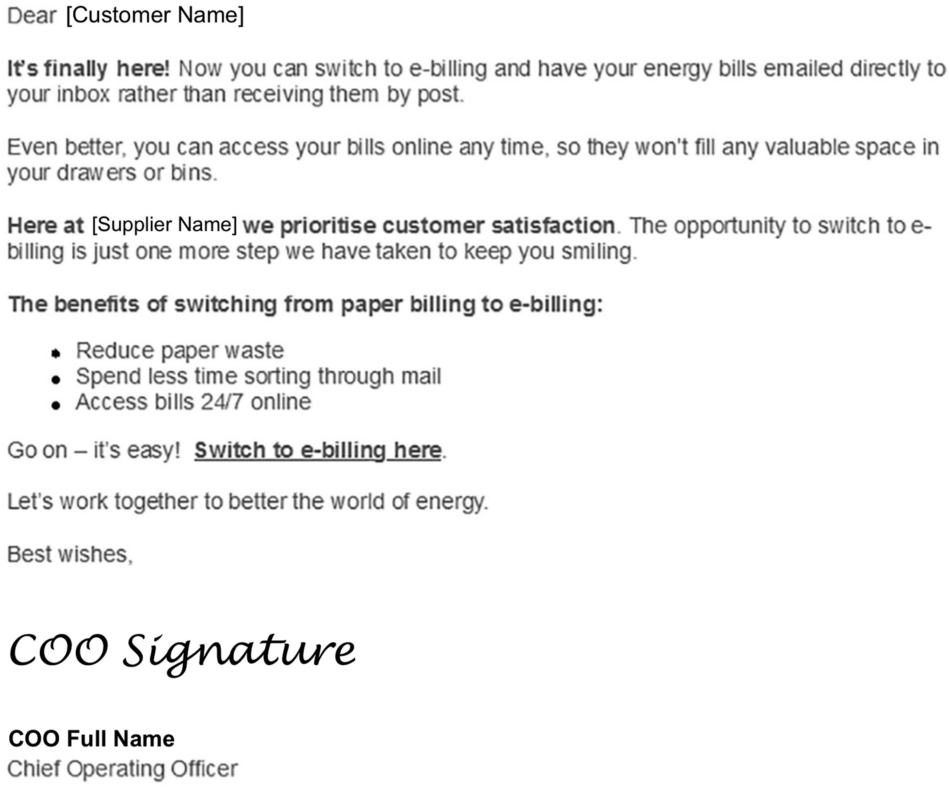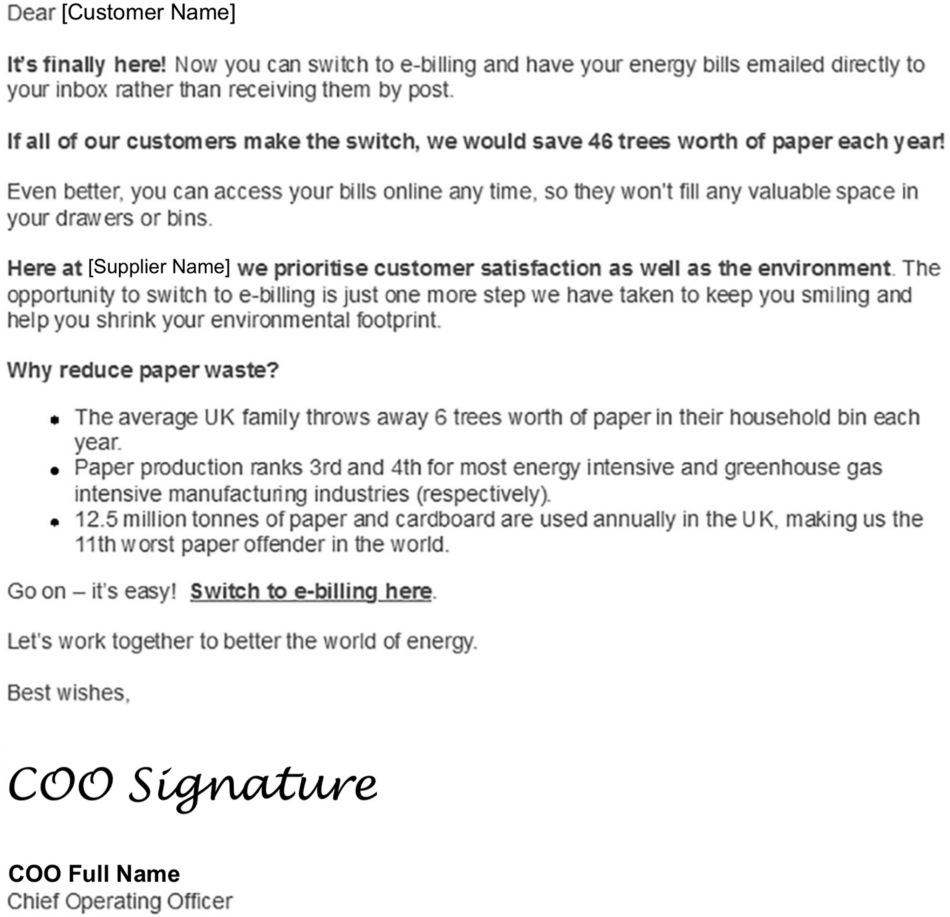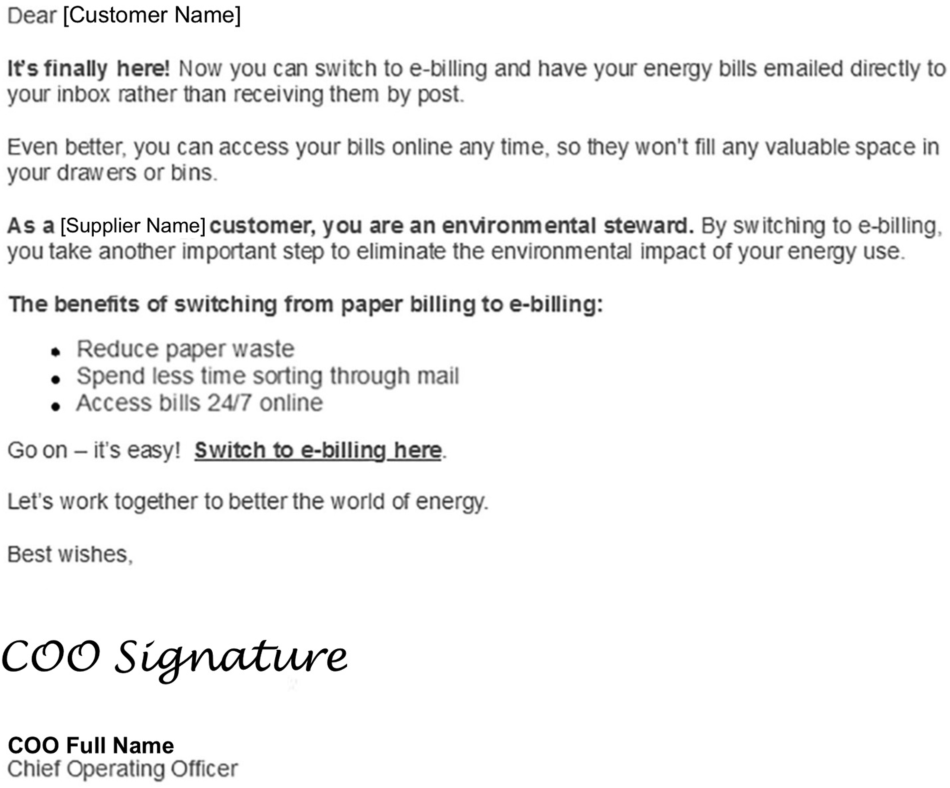
The rapid rise of digital communications ushers new opportunities for corporate environmental responsibility. For instance, online conferencing provides alternatives to air travel for meetings of international colleagues, and online form submission and bill payment schemes reduce requisite paper communications between companies and their patrons. Yet mandating that employees or customers use these options can cause resentment by appearing as a threat to freedom of choice or otherwise leave them worse off, rendering companies justifiably reluctant to dictate customer choices.
Can companies drive socially and privately beneficial norm shifts while continuing to ‘put the customer first’? With a spotlight on encouraging opt-in to paperless communications, our research suggests that how companies communicate with customers may influence voluntary enrolment in programs that increase efficiency and resourcefulness.
A large-scale field experiment
We conducted a large-scale natural field experiment, randomising message framing amongst 38,654 customers of a UK renewable energy utility. In the utility’s email to customers announcing the online billing platform’s launch, we tweaked messaging to: (i) elicit prosocial concern with provision of statistics on environmental damage associated with paper use; (ii) evoke cognitive dissonance — i.e. aversion to inconsistencies between one’s past and current beliefs and behaviours — by reminding the customers of their green identity; and (iii) increase vividness of the email using environmental imagery.
The results
Overall, 13.42 per cent of customers signed up for online billing results indicate that environmental information and imagery does not increase the likelihood of individuals to adopt; in fact, in most cases, the email without the image outperformed the email with the image.
We do find, however, that receiving the cognitive dissonance-inducing messaging (without imagery) increases uptake of paperless billing by 1.2 percentage points (9 per cent) among our main sample, for whom gender is identifiable (n=36,810).
Quite contrary to this overarching effect, the cognitive dissonance intervention actually decreases uptake amongst those with doctoral educations (identified by having the title of either ‘Doctor’ or ‘Professor’; n=1844) by 6.2 percentage points (38 per cent) relative to a control group, whose opt-in rates were already relatively quite high (16.4 per cent). Such striking evidence that dissonance-inducing messaging backfires among the highly educated —inducing the opposite effect relative to the main sample — suggests a considerable role for heterogeneous treatment of customers.
Interestingly, when looking within the sample, we see that being female decreases the odds of signing up to online billing by 3.6 percentage points (27 per cent), which contradicts the general conclusion in the literature that females are more likely to engage in environmental behaviours than males.
Figure 1. Email control intervention
Source: Gosnell, 2018
Figure 2. Environmental framing intervention
Source: Gosnell, 2018
Figure 3. Cognitive dissonance intervention
Source: Gosnell, 2018
Figure 4. Control and environmental framing intervention
Source: Gosnell, 2018
Targeted messaging to encourage behaviour change?
Overall, the research suggests that organisations may be better off utilising the more subtle psychological tactics of cognitive dissonance to appeal to prosocial customers’ self-image — rather than provision of social information to appeal to their altruism — as a tool to encourage environmental action. That said, knowing your audience is key, and organisations should take considerable measures to acquaint themselves more deeply with their customers and tailor messaging accordingly.
♣♣♣
Notes:
- This blog post was written in collaboration with Emma Claydon. It is based on the author’s paper Communicating Resourcefully: A Natural Field Experiment on Environmental Framing and Cognitive Dissonance in Going Paperless, Ecological Economics, December 2018.
- The post gives the views of its author(s), not the position of the institutions they represent, the LSE Business Review or the London School of Economics.
- Featured image credit: Photo by Brendan Wood, under a CC-BY-SA-2.0 licence
- When you leave a comment, you’re agreeing to our Comment Policy.
 Greer Gosnell is a research officer at LSE’s Grantham Research Institute on Climate Change and the Environment. She received a Ph.D. in environmental economics at LSE. Her research combines experimental and behavioural economics to reveal cost-effective climate change mitigation strategies at the microeconomic level. Her current projects focus on the contexts of commercial fuel efficiency (especially in the aviation industry), residential energy and resource use, and virtual grid capacity. She is also a catalyst with the Berkeley Initiative for Transparency in the Social Sciences (BITSS).
Greer Gosnell is a research officer at LSE’s Grantham Research Institute on Climate Change and the Environment. She received a Ph.D. in environmental economics at LSE. Her research combines experimental and behavioural economics to reveal cost-effective climate change mitigation strategies at the microeconomic level. Her current projects focus on the contexts of commercial fuel efficiency (especially in the aviation industry), residential energy and resource use, and virtual grid capacity. She is also a catalyst with the Berkeley Initiative for Transparency in the Social Sciences (BITSS).









